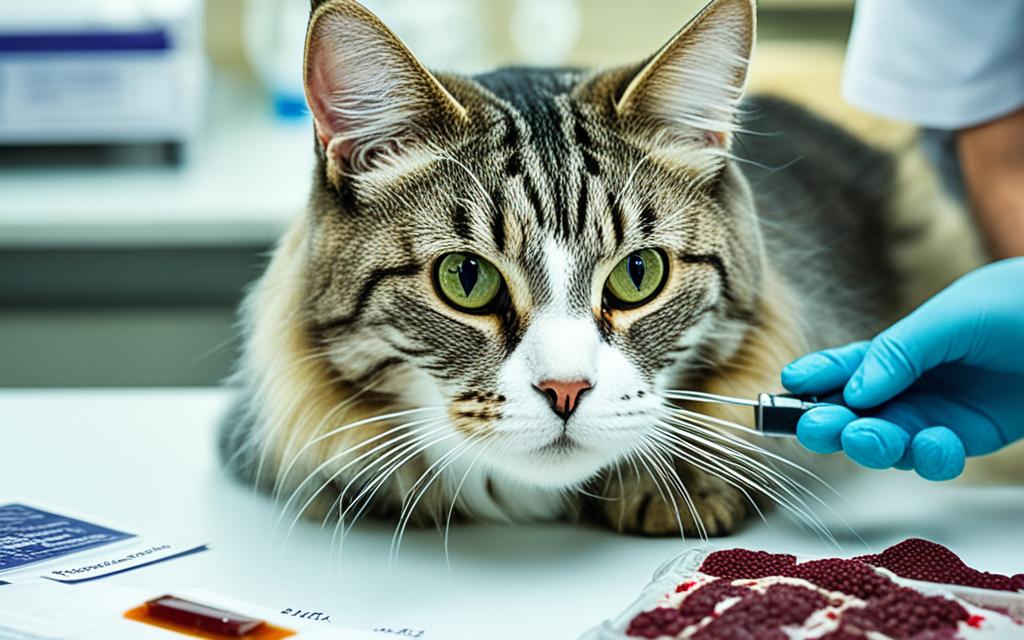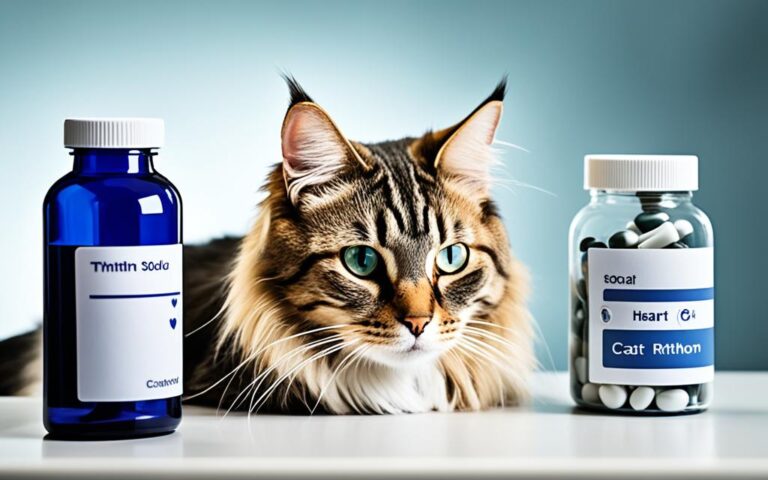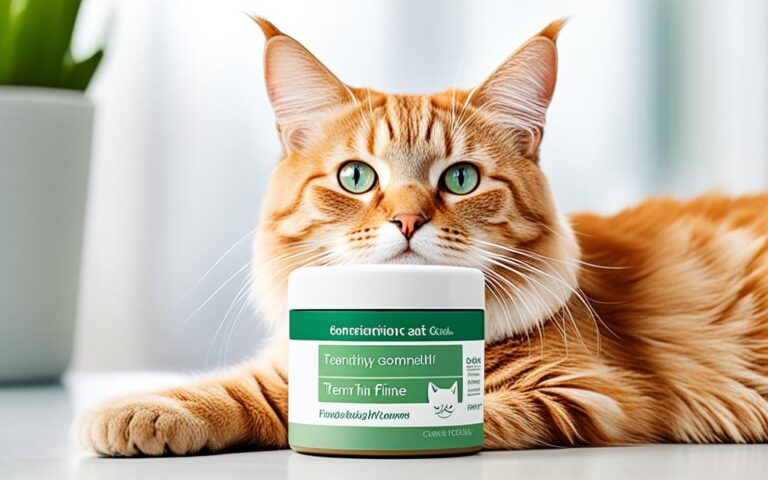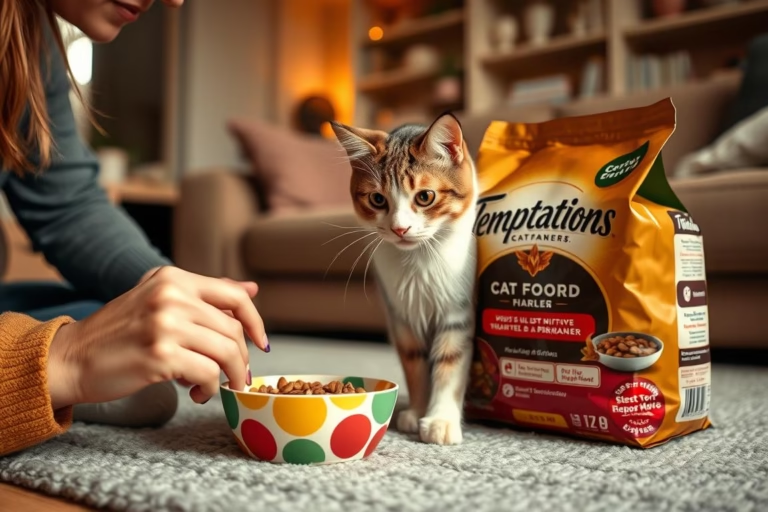Pancreatic Enzymes’ Role in Digestion of cats
About 90% of pancreatitis cases in cats have no known cause1. This point stresses how crucial it is to grasp the role that pancreatic enzymes play in cat digestion. The pancreas of a cat has two key jobs. The first is to make insulin and glucagon, hormone producers. The second is to make enzymes that help digest fats, proteins, and carbohydrates2. If these enzymes start working too early, it can lead to pancreatitis, a severe condition in cats.
Cats can’t break down starch well because they have little amylase in their spit and pancreas. They also lack maltase in their pancreas and don’t have lactase or sucrase at all3. Plus, the ability to break down certain sugars in a cat’s gut wall is lower than in many other animals. Interestingly, this ability grows as you move from the cat’s stomach to their lower gut – something quite unique3. All this info underlines why we need to know about pancreatic enzymes to keep cats healthy.
Key Takeaways
- Pancreatic enzymes play a crucial role in the digestion of fats, proteins, and carbohydrates in cats.
- Premature activation of pancreatic enzymes can lead to pancreatitis, a serious inflammatory condition in cats.
- Cats have limited starch digestion capacity due to low amylase activity in their saliva and pancreas.
- Disaccharidase activity in the feline intestinal brush border is low compared to other species.
- Understanding the role of pancreatic enzymes in cat digestion is essential for managing various pancreatic disorders.
Table of Contents
Understanding the Feline Pancreas
The cat’s pancreas is small but very important. It lies between the left kidney and the gut. This organ does two big jobs. It makes hormones needed for controlling blood sugar; these are insulin and glucagon. It also makes digestive enzymes to help break down food4.
Endocrine and Exocrine Functions
The endocrine part of the pancreas helps keep blood sugar in check. It does this by making insulin and glucagon. The exocrine part, on the other hand, lets out many digestive enzymes. These enzymes, like amylase and lipase, help digest carbs, fats, and proteins needed for your cat to stay healthy4.
Pancreatitis: A Serious Feline Condition
Pancreatitis is not to be taken lightly. It’s the swelling of the pancreas, often life-threatening. This happens when the pancreas’s digestive enzymes start working too early. Pancreatitis is seen more often in cats these days4. Normally, it’s hard to point to what causes it. But, sometimes it shows up after a cat has other long-lasting health problems4.
Some cats with pancreatitis also have liver and gut issues, called “triaditis.”5 It can happen to any cat, regardless of its gender, age, or breed. This problem can either be mild or very serious. A small number of these cats might have it come back more than once. This is called chronic pancreatitis5.
The causes of pancreatitis in cats are often unknown. Its symptoms include things like not wanting to eat, throwing up, and belly pain5. It just seems to happen without a clear reason5.
“Pancreatitis is a serious and potentially life-threatening condition in cats that requires prompt veterinary attention.”
Diagnosis of Pancreatitis in Cats
Diagnosing pancreatitis in cats is not easy. There isn’t just one test to confirm it6. Vets use signs, blood tests, and images to find out if a cat has it6. Knowing about these tools helps to treat it quickly and well.
Blood Tests and Imaging Techniques
Blood tests are key in checking for pancreatitis. One important test is the fPLI assay. It finds if the pancreas is inflamed6. The SNAP fPL and Spec fPL tests make diagnosing easier and faster, giving accurate results7. These tests are good at spotting pancreatitis, even in cats that don’t show many signs.
Veterinarians also use ultrasounds to look at the pancreas. This helps see any changes that could be from pancreatitis6. If needed, a biopsy might be done to be sure of the diagnosis6.
| Diagnostic Test | Explanation | Accuracy |
|---|---|---|
| fPLI Assay | Detects pancreatic inflammation | Reliable indicator of pancreatitis |
| SNAP fPL Test | Rapid in-clinic test for pancreatitis | Provides quick results |
| Spec fPL Test | Quantitative test for pancreatitis | Sensitivity of 79%, Specificity of 82% |
| Abdominal Ultrasound | Visualizes changes in the pancreas | Helps identify pancreatitis |
| Pancreatic Biopsy | Invasive procedure for definitive diagnosis | Provides conclusive results |
Detecting pancreatitis usually needs using a mix of these methods6. By looking at the signs, test results, and scans together, vets get a clear picture. This guides them in giving the right treatment6.

Treating Feline Pancreatitis
Pancreatitis is a serious issue for a cat’s pancreas, needing quick and full treatment8. The main goals of healing are to fight dehydration, relieve nausea and pain. It also includes offering the right food to help with the cat’s recovery9.
Fluid Therapy and Pain Management
Getting fluids through an IV is important for treating pancreatitis. It fixes fluid and mineral imbalances from the illness8. To help with pain and sickness, vets might also give medicines9.
Nutritional Support and Recovery
Keeping the cat’s appetite normal and giving it good food is vital for getting better8. Vets could use things to boost the cat’s appetite or put feeding tubes in. This ensures that they get all the nutrients they need. Some cats, after a mild case, might need to eat low-fat food to avoid more pancreatitis8.
In severe cases, cats might have to spend time in the hospital for more care. Things like IVs, pain help, and suitable foods might be needed for them10. Yet, most cats can recover fully with early and correct treatment9.
| Treatment Approach | Key Aspects |
|---|---|
| Fluid Therapy | Correcting fluid and electrolyte imbalances |
| Anti-nausea Medication | Alleviating nausea and vomiting |
| Pain Management | Reducing discomfort and distress |
| Nutritional Support | Maintaining appetite and providing adequate nutrition |
| Feeding Tubes | Ensuring proper nutrient intake in severe cases |
Veterinarians know how to tackle pancreatitis and help cats get back to health9. Some cats might need long-term check-ups and care, mainly those with ongoing issues8109.
Exocrine Pancreatic Insufficiency in Cats
Exocrine pancreatic insufficiency (EPI) happens in cats when their pancreas doesn’t make enough digestive enzymes. This makes it hard for them to digest food right, leading to problems like weight loss, diarrhea, and feeling hungrier than usual11. Even though it’s not as common as pancreatitis, diagnosing EPI early is key. Then, cats can get the right treatment – enzyme replacement therapy12.
In cats, the signs of EPI might not be as easy to spot as they are in dogs. But one thing you might notice is that the cat is losing weight. It’s the most common sign people see11. They might also have diarrhea, throw up, and not want to eat. Their fur might not look healthy, and they could feel really tired and weak. Sometimes, EPI can cause blood clotting problems because the cat lacks vitamin K11. Even though cats with EPI don’t usually show much more hunger, they could have other diseases at the same time. These might include long-term gut problems, liver issues, or diabetes11.
Finding out if a cat has EPI can involve several tests. The main test looks at something called serum trypsin-like immunoreactivity (TLI)13. If the level of TLI in the blood is low, it often means the cat has EPI. This TLI test is really good at spotting EPI in cats and dogs11. In the past, vets used tests with feces to check for EPI. But those weren’t perfect and needed more than one sample to be sure11.
Interesting fact: The more we know, the more we find cats with EPI. Better ways to test for it have helped us find more cases13. It seems any cat could get EPI, no matter its breed or age. This finding is different from what we used to think. We thought only older cats could get it12.
To help a cat with EPI, adding certain enzymes to their food can make a big difference12. These enzymes come from pig pancreas or the pancreas of beef, pork, or game. Using these enzymes can improve how well the cat absorbs nutrients. This, in turn, helps the cat be healthier121113.
Pancreatic Enzymes for Cats
Pancreatic enzymes are key in making sure cats digest food well14. If the pancreas can’t make enough enzymes, cats might need pancreatic enzymes14. This happens in illnesses like pancreatitis or EPI14.
These supplements, made from pig pancreas, help with digesting fats, proteins, and carbs14. They are not FDA-approved but vets use them to treat conditions such as EPI in cats and dogs14.
Cats might not like the powder form of these enzymes in their food at first. But, sometimes vets suggest using capsules or tablets instead to make it easier for cats to take them14. Remember, it’s crucial to give these enzymes just to cats with EPI as a diagnosis14.

Pancreatic enzyme therapy works well when done correctly, with an 85% success rate in treating EPI15. Yet, in some cases, about 15%, it might not work as well due to other problems15.
There are a few side effects to watch for, like diarrhea, stomach aches, and vomiting14. Giving too much can cause problems like more diarrhea, aches, and vomiting14. So, always follow your vet’s advice closely to prevent these issues14.
“Pancreatic enzymes are a valuable tool in managing feline exocrine pancreatic insufficiency, but they must be used under the guidance of a qualified veterinarian to ensure the best possible outcomes for our feline companions.”
Using pancreatic enzymes right can greatly help cats with EPI or other pancreas issues14. But, it’s very important to work closely with your vet and follow their instructions14. This way, you can ensure your cat’s digestive health and nutrient absorption are at their best141615.
Administering Pancreatic Enzyme Supplements
Pancreatic enzyme supplements help with feline health issues linked to pancreatic problems. They come in tablets or powder and are given to cats at meal times17. It’s very important to follow the vet’s advice on how much and how often to give them. This makes sure the cats get the right amount to help their digestion and avoid issues.
Dosage and Frequency Guidelines
The needed amount of pancreatic enzyme supplements can change based on how serious the problem is and the cat’s weight18. Vets will set a specific plan for the dosage. This plan might need to be updated as the cat’s health changes.
Always listen carefully to the vet’s instructions when using these supplements. Too much can upset the cat’s stomach. But, too little might not help enough18. It’s crucial to regularly check in with the vet to make sure the supplement is still needed and working well.
For cats with acute pancreatitis, a simple, easy-to-digest diet and enzyme supplements can boost their recovery17. This method aids in healing and makes it easier for the cat to absorb nutrients.
Cats with chronic pancreatitis might need these supplements for life to help them digest food well and stay healthy17. These supplements are usually made from pig or cattle pancreas and can be costly.
| Pancreatic Enzyme Supplement | Dosage | Frequency |
|---|---|---|
| Viokase | 1/4 to 1 teaspoon per meal | With each meal |
| Pancrezyme | 1/2 to 2 capsules per meal | With each meal |
Working with your vet is key to finding the right enzyme, dose, and schedule for your cat17. This ensures your cat’s well-being while managing their condition well.
“Proper management of pancreatic insufficiency in cats can lead to a happy and healthy life for the feline.”18
171918
Potential Side Effects and Precautions
Pancreatic enzyme supplements can help cats with stomach troubles. But, it’s vital to know about possible bad effects and how to use them safely20. Using too much of these supplements can lead to tummy problems like sores in the mouth, throwing up, and runny poop20. In some cases, cats might have serious reactions, like their face swelling up, getting hives, or finding it hard to breathe20.
Always talk to a vet before giving these supplements to your cat, especially in certain cases20. If a cat is allergic to the supplement or where it comes from (like pork), they shouldn’t have it20. Also, using these enzymes with pregnant or nursing cats needs caution. It’s because we’re not sure if they’re entirely safe in those cases20.
If your cat has liver or kidney problems, using these supplements needs extra attention20. And, be careful about mixing these enzymes with certain drugs. They might not work well with meds like antacids, or blood-thinning drugs20.
Keeping the supplements in a good condition matters a lot20. They should stay cool and dry, and away from light and water. This keeps them working as they should20.
Knowing all this helps keep your cat safe when using pancreatic enzymes. Working with your vet is key to make sure they do more good than harm for your cat20.
Comparing Pancreatic Enzyme Therapies
When it comes to treating cats with pancreatic enzyme therapies, we need to think about a few things. This includes how well they work, the cost, and if they’re safe. Different cats may do better with one therapy over another, according to their specific health needs and how they react to treatment21.
Efficacy Considerations
Cats with low levels of serum feline trypsin-like immunoreactivity (fTLI) might benefit most from these supplements. This is especially true for cats diagnosed with exocrine pancreatic insufficiency (EPI)21.
Signs of feline EPI include losing weight (69%), having diarrhea (68%), vomiting (41%), and other stomach issues21. Using pancreatic enzymes can help these cats gain weight, have solid stools, and live a normal life22.
Cost Considerations
The price of these therapies can differ, and it’s wise for pet parents to think about both the upfront and long-term costs. While some brands are cheaper, it’s important to choose what’s best for the cat’s health and how they react to it.
Safety Considerations
Cats generally handle these supplements well, with few side effects23. But, it’s still key for owners to watch out for any bad reactions and take precautions as needed.
Looking at how well they work, their cost, and if they’re safe, vets can guide pet parents to the best choice. This ensures their cat gets the right support for their digestion needs.
Benefits of Pancreatic Enzyme Supplements
Using pancreatic enzyme supplements for cats has many pluses24. It includes better digestion, more nutrient uptake, and easier weight control. These supplements are great for cats with specific pancreatic issues or those needing extra enzymes.
Easier digestion is a top gain from pancreatic supplements24. They refill enzymes critical for breaking down food. This allows cats to absorb vital nutrients better, leading to improved health and a happier cat.
They also boost how well nutrients get used24. A cat’s body can soak up food nutrients more easily with these supplements. This can keep the cat at a healthy weight and make their coat shine.
Moreover, these supplements can cut down on diarrhea in cats24. They enhance the cat’s digestive process, easing tummy troubles and encouraging gut health.
“Making sure cats get enough enzymes is key to their health. Adding supplements should happen with your vet’s advice if your cat shows signs of needing more enzymes.”24
The upsides of pancreatic enzyme supplements are especially important for specific cat health issues or after surgeries that impact digestion24. Always discuss with your vet for the right dose and usage plan tailored to your cat.
| Benefit | Description |
|---|---|
| Improved Digestion | Pancreatic enzyme supplements can help cats break down and absorb essential nutrients more effectively, leading to better overall health and body condition24. |
| Enhanced Nutrient Absorption | By improving the extraction and utilization of nutrients from food, pancreatic enzyme supplements can contribute to better weight management and a healthier, shinier coat24. |
| Reduced Diarrhea | Pancreatic enzyme supplements have been shown to alleviate gastrointestinal issues and promote overall intestinal health, leading to a reduction in the incidence of diarrhea24. |
252426
Monitoring and Long-Term Management
When cats need pancreatic enzyme supplements for certain health issues, keeping a close eye is key. Vets check how well the cat is doing over time, including if the dose needs adjusting. They also look out for other problems, like diabetes, that might show up because of the original health issue27.
About two-thirds of cats with pancreatitis have it as a long-term issue, making clear rules for treatment harder to find27. Many of these cats also get other health problems, like diabetes and liver issues27. Getting enough nutrition can be tough for these cats, so adding nutrients through their stomach is a common suggestion. This kind of support can help these cats take in the calories they need27.
Cats with pancreatitis usually don’t need antibiotics because it’s usually a sterile process27. But if there’s a worry about stomach ulcers, medicines that lower acid levels in the stomach might be advised27. Often, these cats have a trio of problems which could include inflamed bowels, liver and pancreas issues. They all need to be handled together27.
Checking how well the enzyme supplements are working should happen regularly. Vets keep watch on how the cat is doing and tweak the treatments as they see fit. This active approach is vital for managing feline health conditions long term and getting the best outcomes27.
Owners play a big role too by watching for signs like their cat’s appetite and energy. This teamwork of pet owners and vets is crucial for taking care of the cat with pancreas issues27.
Conclusion
Cats need pancreatic enzymes for good digestion and nutrient absorption28. It’s crucial to know about the feline pancreas. This includes its jobs and the issues it can face. This knowledge helps keep cats healthy29.
Working with vets is key for cat owners. Together, they can tackle problems like pancreatitis. Treatments, including enzyme supplements, are important28. These supplements boost treatment results and help manage pancreas issues long-term28.
Being proactive about cat health is important. This means regular checks, watching their diet, and understanding the role of enzymes. These steps help ensure cats live their best lives30.
FAQ
What are the two main functions of the feline pancreas?
What is pancreatitis and how can it affect cats?
How do veterinarians diagnose pancreatitis in cats?
What are the main goals of pancreatitis treatment in cats?
What is exocrine pancreatic insufficiency (EPI) in cats?
How do pancreatic enzyme supplements help cats?
What are some potential side effects and precautions to consider when using pancreatic enzyme supplements in cats?
What factors should be considered when selecting a pancreatic enzyme supplement for a cat?
What are the benefits of providing cats with pancreatic enzyme supplements?
What is involved in the ongoing monitoring and long-term management of cats on pancreatic enzyme supplements?
Source Links
- Pancreatitis in Cats
- Nutrition and Pancreatic Disease in Cats | VCA Animal Hospitals
- Cats and Carbohydrates: The Carnivore Fantasy?
- Feline Pancreatitis
- Pancreatitis in Cats | VCA Animal Hospitals
- Pancreatitis in Cats
- Feline Pancreatitis – Mar Vista Animal Medical Center
- What to Know About Pancreatitis in Cats
- Pancreatitis in Cats: Diagnosis, Treatment, & Recovery | Bond Vet
- My cat has pancreatitis | International Cat Care
- No title found
- Exocrine Pancreatic Insufficiency in Cats – WSAVA 2014 Congress
- Diagnosis and treatment of EPI in cats
- Pancreatic Enzymes for Dogs and Cats
- Pancrelipase | VCA Animal Hospitals
- PancrePlus
- Pancreatic Enzyme Supplements for Cats
- Pancreatin for Cats
- PANCREATIC ENZYME PRODUCTS: Overview, Uses, Side Effects, Precautions, Interactions, Dosing and Reviews
- Enzymes | VCA Animal Hospitals
- Signalment and Clinical Data of Cats with Exocrine Pancreatic Insufficiency Diagnosed Using Feline Trypsin-like Immunoreactivity in Routine Diagnostics
- Exocrine Pancreatic Insufficiency in the Cat
- A comparative proteomic study of plasma in feline pancreatitis and pancreatic carcinoma using 2-dimensional gel electrophoresis to identify diagnostic biomarkers: A pilot study
- Digestive Enzymes for Cats: Everything You Need To Know – Cats.com
- Clinical Nutrition | Cummings School of Veterinary Medicine
- Benefits of Digestive Enzymes in Dogs & Cats – Furchild
- Feline Exocrine Pancreatic Insufficiency: A Retrospective Study of 150 Cases
- Feline Pancreatic Lipase – Bioguardlabs
- No title found







